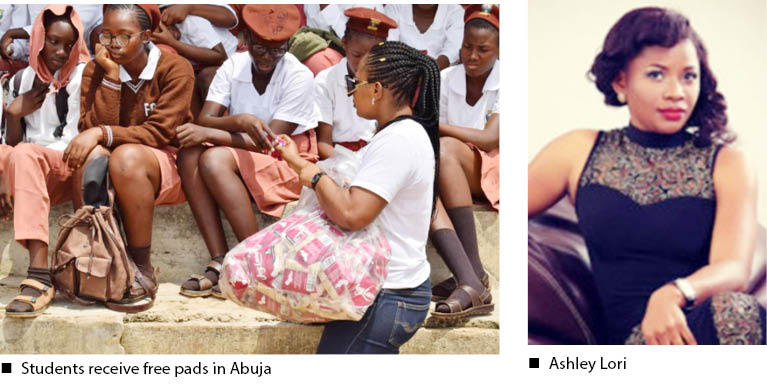‘Free pads should be given in schools as many girls use newspaper and rags’
Ashley Lori is the founder of a Non-Governmental Organisation (NGO), Pad-Up Africa. In this interview, she says many school girls from poor families cannot afford sanitary pads during their monthly period and skip classes even during examinations, and that some use newspapers, rags and several insanitary items as alternative. You are championing the supply […]

‘Free pads should be given in schools as many girls use newspaper and rags’
Ashley Lori is the founder of a Non-Governmental Organisation (NGO), Pad-Up Africa. In this interview, she says many school girls from poor families cannot afford sanitary pads during their monthly period and skip classes even during examinations, and that some use newspapers, rags and several insanitary items as alternative.
You are championing the supply of free sanitary pads to school girls and creating awareness on menstrual hygiene. What informed your effort?
I was passing by a supermarket and saw girls in school uniforms near a tree with blood stains on newspaper pages near them. I thought one of them was injured, so I went closer to inquire. I immediately realised that one of them was on her period and was using a newspaper page as pad. I felt bad because it was a gory sight. I then took them to the supermarket nearby and bought each of them a pack of sanitary pads before I took them back to school where one of their teachers told me that they used other things as pad.
I got curious and asked some of them questions about their menstrual hygiene and they opened up. They said they used leaves, paper, plantain peel and some said the wear up to six skirts while on their period.
Do you foresee challenges in the provision of the free pads?
Funding is a problem. Initially I thought it was a small thing, but during my research I realised that there were many schools in other states that have big menstrual needs. It is so painful that people don’t even know that this is a problem because if a girl will miss classes even during exams because she cannot afford sanitary pads, it simply means, we are failing. I wonder why we have condoms for free; even in schools, and we cannot have sanitary pads too; for free. Sex is a choice, but girls bleed naturally every month, and if you are to use sanitary pads, you have to use two packs.
Most of the women that take their children to public schools where education is offered free of charge cannot even afford sanitary pads for them.
There are other challenges that limit the use of menstrual products which also influence hygiene practices among school schools. We had a situation where we went to a school and a student told us that her mother refused to allow her to use sanitary pads because they contained fertility control components that were effective in preventing pregnancy later in life. But then, we tried and traced the mother who told us that she used that trick on her daughter because she wouldn’t want to introduce her daughter to what she could not sustain; buying pads monthly.
Have you been working with the government and parents?
We conducted a rally in Abuja as part of the awareness campaign; actually to call on government to look into this, and we are calling on anybody or group that has affiliation with the government to work together with us and improve sanitary hygiene among school girls. This can be in the form of making and distributing free biodegradable pads. But people are afraid; that the free pads could be sold by people. There is a tracking system that helps to hold people to account, because every pad has a code that shows the school it is supposed to be used in.
In the meantime, we are funding ourselves with support from some families, but if the government comes in and makes the project a priority, like the need for water and good roads, it will encourage girls to stay in school.
Is there any alternative to the disposable napkins some girls use in schools?
We are also going to train mothers on how to use a reusable pad and how they can make a reusable pad with what they have and their girls can go with them for two or three days. They can only wash and recycle; that is healthy and economical.
We went to the Federal Government Girls College, Bwari, and built awareness about menstrual hygiene, because after visiting a number of schools recently, we discovered improper disposal menstrual waste by students. So, we educated over 2,000 girls in Bwari about good menstrual hygiene management, including use and proper disposal of pads, in addition to distribution of free packs of pads.
